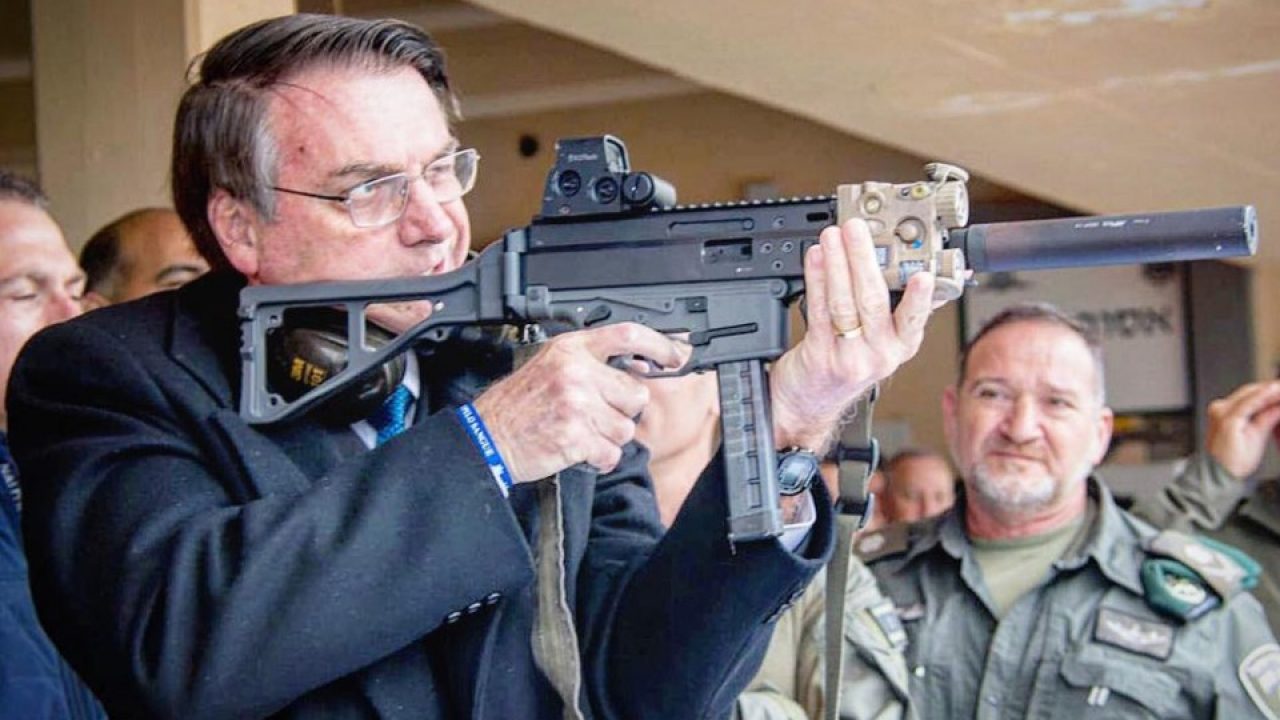RIO DE JANEIRO, BRAZIL – The August 12th, 1937 cover of the Correio da Manhã newspaper is all over social media. The headline reads: “Mussolini says only an armed people is strong and free.” At the time, the Italian fascist leader addressed 100,000 people in Sicily.
Does the statement sound familiar? At the April 22nd cabinet meeting, President Bolsonaro said “I want everyone to be armed; an armed populace can never be enslaved.”

The same reasoning surfaced in President Jair Bolsonaro’s speech during the notorious April 22nd cabinet meeting. “The people are indoors. That’s why I want (…) the people to arm themselves,” he said. The next day, the then Minister of Justice and Public Safety, Sérgio Moro, and the Minister of Defense, Fernando Azevedo, signed an inter-ministerial ordinance that increased the amount of ammunition that can be bought by each citizen per gun by a factor of 12 – from 50 to 600 per year.
“A shit Mayor’s shit issues a shitty decree, shackles people, forces everyone indoors. If they had a gun, they’d go out on the street. (…) Sign this ordinance today, that I want to send a fucking message to these shits! Why am I arming the people? Because I don’t want a dictatorship,” continued the President.
According to the NGO Instituto Sou da Paz, it was the fourth measure signed by Bolsonaro that week relaxing weapon control in the country. Before that, he had overturned three other Army ordinances that “introduced significant progress for the marking, control, and tracking of weapons and ammunition,” according to the organization.
But the President made other attacks against disarmament during his year and a half in office. In the early days of his government, he signed a decree to relax possession of weapons at home.
Later, in May 2019, the President signed a decree authorizing more professional categories to carry guns – a measure that ended up being overturned in Congress. Summing up all these initiatives, Sou da Paz estimates that Bolsonaro has already taken six measures to enforce his desire to arm the population.
The Disarmament Statute has been in force in Brazil since 2003, which Bolsonaro and the “bullet-backbenchers” have targeted because it has set strict rules for the acquisition of weapons. Currently, an ordinary citizen is authorized to own a weapon inside his/her home based on several criteria, but carrying it on the streets is prohibited.
Before it came into effect, guns and revolvers could be purchased free of bureaucracy in sports stores or large department stores, as is the case in the United States.
Fascist rhetoric
Historian Federico Finchelstein, an expert on fascism and populism, explains that Bolsonaro’s pro-gun rhetoric observed during the April 22nd cabinet meeting is inspired by the totalitarian and fascist regimes of Benito Mussolini in Italy and Adolf Hitler in Germany.
But the President also echoes the discourse of Venezuelan Hugo Chávez, who even advocated that a million people should arm themselves to prevent a purported US invasion; he channels the pro-gun lobby in the United States, which equates being entitled to carry weapons with freedom. Some groups have even argued that Jews could have prevented the Holocaust had they been able to acquire weapons.
“On the one hand, Bolsonaro promotes the fascist policy of the disease, according to which the most vulnerable, in general, the poor and the elderly, must die,” explains the historian, in reference to the fact that the ruler remains indifferent to the more than 20,000 deaths by coronavirus in Brazil. The New School for Social Research professor has been saying since the 2018 elections that the current President is one of the populist leaders closest to fascism.
“On the other hand, violence is central to fascism. Relating this promotion of political violence by Bolsonaro to the destruction within democracy promoted by fascist regimes is necessary,” he adds. “They created the illusion that the streets were violent and, with that, they promoted the creation of fascist militias. In other words, it was a self-fulfilling prophecy, because those who promoted chaos and death were the fascist agents of disorder”.
The foundation of fascist militias occurred both in Mussolini’s Italy and in Hitler’s Germany. “The SA and the SS were armed civilians within the Nazi party who were later incorporated into the state,” explains the historian. He claims that the creation of paramilitary groups in dictatorships is normal, but points out that another factor that draws Bolsonaro closer to fascism is “the advocacy of violence as an end in itself”.
Although he believes that Bolsonaro also bears similarities to Chávez, the historian explains that in Venezuela violence was promoted as “a means”. There, the Chavista regime fostered the creation of organizations, paramilitary groups that operate in the communities. In Brazil, the Bolsonaro family is under investigation for its links with militiamen in Rio de Janeiro, among them the head of the so-called Crime Bureau, former police officer Adriano da Nóbrega, who was killed in Bahia this year.
“The notion that people need to arm themselves to defend themselves is false, we know that Bolsonaro wants to destroy democracy from within. It is the State that holds the monopoly on violence within a democracy, so why would a ruler want to undermine that monopoly?”, Finchelstein questions.
“He wants a strong and violent State, but also for his followers to encourage this violence. He wants people to arm themselves against the autonomy of the judiciary, against Congress, against the press, against governors and mayors,” he concludes.
Source: El País

